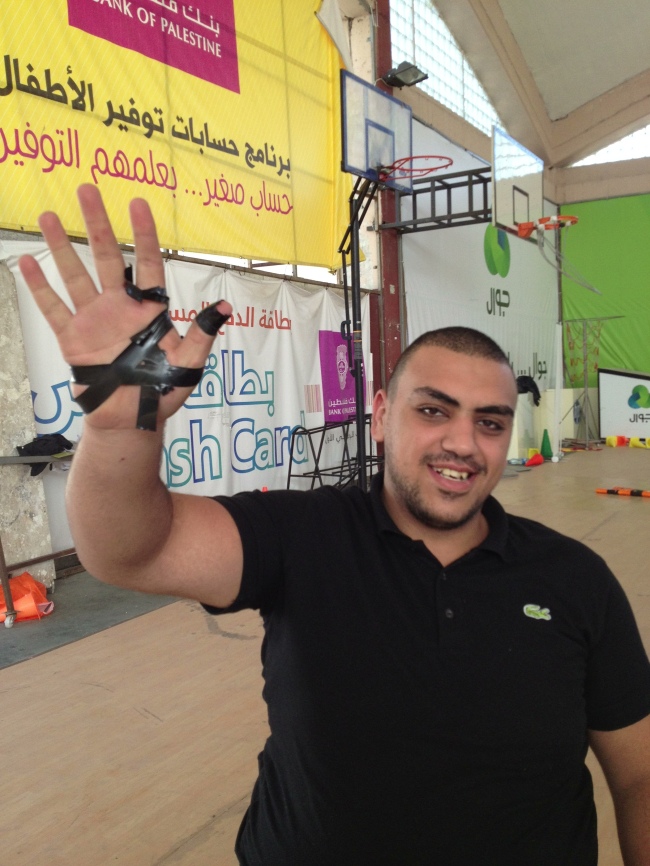I just returned home from my first training camp in Palestine. What a tremendous way to finish an epic two months. It was a fantastic experience, and I felt an instant bond with the people there. Palestinians, like the Afghans and Cambodians I’ve come to know so well, are warm, welcoming people with dynamic personalities that endeared me to them immediately. They also have great senses of humor, which allowed us to bond very quickly.
The clinic was organized by the Palestinian Paralympic Committee’s secretary general, Ehsan Idkaidek, who has been at the forefront of a recent resurrection of wheelchair basketball in the country since it disappeared during the second Intifada in 2000. Ehsan, whose disability (polio) is too severe for him to play wheelchair basketball himself, is a natural leader who has the intelligence and strength of will to reinvigorate disability sports in the country after a decade without them. In addition to being the Paralympic secretary general, Ehsan also sits on the board of a local sports club in Ramallah, which hosted the training camp.
In a remarkable small world moment, another member of the club’s board, Nader, who served as my interpreter during my stay, perfected his English while getting a bachelor’s degree at Portland State University. What are the odds that I’d travel all the way to the West Bank and end up working with someone who lived in my hometown?? As a result of his time living in Portland in the early 90s, Nader is also a fellow die-hard Blazer fan! Amazing.
The thing that separated this clinic from those I’ve conducted previously was that half the players had been playing wheelchair basketball for at least five years, with many having started in the mid-90s when the game first came to Palestine. All of them stopped from 2000 to around 2009 due to the Intifada, but the experience and knowledge level of several of the older players was much higher than the foreign players I’ve coached in the past. The other half of the players, however, had just started playing the game, with many never having sat in a chair before the first day of the clinic.This presented a unique challenge, since I needed to create completely different training plans for the two halves of the player pool to ensure each developed at its appropriate level, while finding ways to involve each group in both morning and afternoon sessions.
Luckily, I had access to several assistant coaches – some of whom were among the pool of experienced players, while others were high-level able bodied basketball players or other athletes who graciously volunteered to get involved in teaching and promoting the game. The coaches did a great job helping to ensure the younger players mastered the basics of the game during the more advanced training sessions for the experienced players. As a result of being able to learn new skills in the afternoon with me, then reinforce those skills with the assistant coaches the following morning, the new players’ learning curves were amazingly steep. A few of the young players struggled to push their wheelchairs at the beginning of the first day – literally getting once around the court was a huge ordeal. By the end of just three days of training, though, they had all advanced to the point of being able to effectively shoot, pass, dribble and play defense, and some of them were even pushing toward being included in the advanced group by the afternoon of the last day.
On the final day, we broke the players up into four teams mixed between experienced and new players and held a day-long tournament. As always, inserting the players into a competitive environment brought out the best in everyone. The tournament was attended by members of the U.S. Consulate, which provided funding for the clinic, as well as the Paralympic Committee, Palestinian military representatives, and other local dignitaries. It was a hugely positive day that concluded with awards being presented and players lining up to give high fives and hugs to their new American coach as we wished each other goodbye and good luck.
Palestine is in a very difficult political situation right now, but it was a true privilege to get to participate in an experience that brought nothing but happiness and excitement to all involved. Many thanks to Ehsan, his colleagues, and all the players for making me feel so at home so quickly. I look forward to returning to help them continue building their program as soon as possible.

Said, one of the new players in the group, developed a nasty blister on the palm of his right hand during the three days of training. I told him to tape it before the tournament. This is what he came back with.

Enjoying a Palestinian meal with (from left) the country’s best player, Khalid, Paralympic Sercretary General Ehsan, and fellow Blazer fanatic Nader
Visiting the old city of Jerusalem with my friend and ICRC colleague, Paul Salvanes, with whom I lived for a short time last year in Jalalabad, Afghanistan

In an impressive feat, zero out of 35 people look at the camera during a posed photo with the tournament champions after the presentation of their medals
Leave a comment